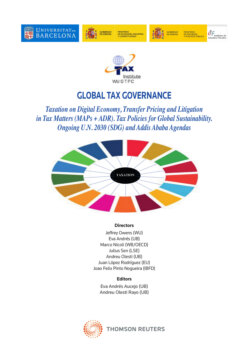Читать книгу Global Tax Governance. Taxation on Digital Economy, Transfer Pricing and Litigation in Tax Matters (MAPs + ADR) Policies for Global Sustainability. Ongoing U.N. 2030 (SDG) and Addis Ababa Agendas - Jeffrey Owens - Страница 12
На сайте Литреса книга снята с продажи.
Presentation 2 International Tax Cooperation. A Work in Progress
ОглавлениеMaría Teresa Soler Roch
Emeritus Professor of the University of Alicante. Spain
International Tax cooperation is supposed to be a landmark in the so called post BEPS era. In this respect, international and supranational organizations have done and are still doing a tremendous work, facing new and relevant challenges and moreover, the risk of the lack of consensus and the widespread of unilateral solutions, thus menacing the multilateral approach intended to set up a new legal framework for International Taxation.
Tax Justice and Tax Power are the core questions at the center of the current and ongoing debate. Two different scenarios but at the same time connected, because more fairness in the International Tax System may have an impact in tax policy decisions. In any case, and whatever may be the scope of this connection, both objectives have in common the need for tax cooperation in order to get effective solutions. The task is not easy and the tensions between multilateral and unilateral approach will be there all along the process.
In the field of tax justice in respect of taxpayers’ position, the different initiatives developed since the OECD BEPS project was launched in 2013 and specially more recent proposals, show a tendency to avoid situations of double non (or low) taxation, as well as a revision of traditional principles such as benefit and ability to pay (value creation, fair share) and the nexus with the source country (market jurisdiction); however, new risks of double taxation may arise, thus undermining the fairness of the system from a taxpayer’s perspective.
In the field of tax justice in respect of the States, the current work show a tendency to set up a new level playing field for inter-nation equity, including the proposal of new taxing rights in favor of the source/market jurisdictions countries. This new framework deals with “how to share the pie” and therefore needs cooperation and consensus; a most difficult goal in this case and thus an uncertain outcome for the time being, taking into account the divergent positions between separate entities and arms’ length defenders on one side, and the proposals for consolidation and apportionment on the other.
In the field of tax power, the current proposals show a tendency towards an increasing limitation of the autonomy of tax policy decisions, in other words national tax sovereignty. Needless to say that this is a main battlefront dealing with multilateralism and cooperation against unilateralism and autonomy. Also in this field, the final outcome seems uncertain for several reasons. The first is the legal tool enhancing international tax cooperation, mainly based on soft law instruments, except in the case of specific supranational areas (European Union). The second and more important reason deals with the different and sometimes opposite positions an economic interests of the States involved in the process; in this respect and beyond the traditional difference between developed and developing countries, the so called “intermediary countries” (some of them well developed) may raise concerns and this will be a hard way to the global consensus.
At the end of the day, tax cooperation may be reinforced but national sovereignty will still be strong and preserved, as long as the wording used in the allocation rules of the Tax Treaties will continue to say “may be taxed…” instead of “shall be taxed…”. Nothing will be the same, but neither so different.
